I’ve heard about KhanAcademy.org a few times since about 2009-2010. But I haven’t really explored it or learned much about it. It was just one of those “good things” on the Internet, which was about education and which was a not-for-profit. And now I can’t believe I’ve been missing out on it. Wikipedia page describes the project in a rather dry language:
The Khan Academy is a not-for-profit educational organization, created in 2006 by Indian American educator Salman Khan, a graduate of MIT. With the stated mission of “providing a high quality education to anyone, anywhere”, the website supplies a free online collection of more than 2,800 micro lectures via video tutorials stored on YouTube teaching mathematics, history, healthcare and medicine, finance, physics, chemistry, biology, astronomy, economics, cosmology, organic chemistry, american civics, art history, microeconomics and computer science.
There you go. A cheese slogan, a single guy, a bunch of videos on YouTube – what’s all the big fuss about, right? Wrong! Here is a better way to get introduced to the project – a TED talk by Salman Khan.
[youtube=http://www.youtube.com/watch?v=gM95HHI4gLk]
Cool, isn’t it? And it has nothing to do with the appearance of Bill Gates there. Apparently, Bill Gates is a big fan of the project. He mentioned it a few times in the interviews of its own, and according to the Wikipedia page, helps out the project with donations. But I digress.
I went to the KhanAcademy.org project a couple of days ago, without big goals or expectations. I just wanted to see if it was useful to me personally. So I started watching some videos. Not bad. A small popup window informed me that I am getting some sort of points even just for watching videos and that I can save those points by registering and logging in. I clicked in. No lengthy registration forms or activation emails – Facebook or Google account sign-in. Literally, three clicks and five seconds. And I was back to videos.
At first, I was watching videos on history and American civics and such. I especially was trying to stay away from science, since my head is full these days with other things. But. Those history and civics videos were good. The ones I saw were short – only 10-15-20 minutes, not like most other video lectures I’ve seen online – things that span anywhere from 40 minutes to a couple of hours. Nothing like that! And Khan videos were so simple, straight-forward, and specific. No broad discussions, no numerous slides or complicated charts. Just a guy talking in simple words and using some kind of digital blackboard, writing things by hand as needed.
So, I went closer to science things. I’ve watched about viruses and about bacteria in biology section, about plate tectonics in cosmology and astronomy, and a thing or two about interest in finance. I was struck by how simple were some of the explanations. I could understand pretty much everything without doing any research or translation. And that’s where I need to pause for a moment to do a side note.
I’ve been heard a few times, especially at certain work environments, criticizing younger generation of specialists for relying so much on video tutorials. And here I am – praising Khan Academy, which does exactly that – provides video lessons. But that’s not the same. My protests were not against video lessons in general, but against two very specific points – relying solely on video lessons and relying solely on video lessons for the professional education. In other words, I’m saying that if you are a professional chef or doctor or programmer or whatever, you shouldn’t use video tutorials as your only means to teach yourself cooking or medicine or programming or whatever. Video tutorials are nice but they have a whole range of limitations. For professional education, one has to use other materials as well (books, blogs, mentors, encyclopedias, labs and other practical exercises, manuals, etc). But as an addition to the rest, video lessons can be of great value. For non-professional education maybe even more so. After all, who doesn’t like a good documentary on TV?
Now. Back to the Khan Academy and my, and I’m not afraid of big words here, life-changing experience with it in the last few days. I continued with some math videos. I wasn’t going after any specific knowledge at that point. Just wanted to see how well video tutorials apply to mathematics. And maybe if I could learn a thing or two. As I said before – I’m not a big fan of math and I had plenty of horrible experiences with this science from early school, through high school, through college, and even through some of my work experience. (Whether you like it or not, programmers do need to know a few things from math books. That’s a fact.)
Words like algebra, trigonometry, and calculus send shivers down my spine. The feeling of nausea usually nearby. And then I watch a single video, only minutes long – about The Beauty of Algebra – and all of a sudden so many things make sense. I go from fear and forced indifference to a huge respect and mild interest in. And I want more! I followed that with Origins of Algebra and Abstract-ness and that was more than enough to convert me forever. Now, all of a sudden, for the first time in my life, I am interested in mathematics. I want to know more, and I want to know what I don’t know, and what is out there. In my book, just that alone is worth of a Noble prize in mathematics and psychology for Salman Khan! But that wasn’t all I found awesome about this project. There is more.
As I was diving deeper into the website, I noticed the exercises. Those were in a form of simple tests. Each test covers only a single, very specific topic. And if you know the topic, you can pass the test really quickly. If you don’t know enough though – you are referred to related video tutorials that you need, plus you can get a hint on the problem or see a solution to any exercises, step-by-step. And you can practice more, for as long as you need to understand the topic. Which happens pretty fast anyways.
The exercises were cool, but what was even cooler about them, was the system into which they are all tied. Anyone who played video games like Civilization or Settlers or pretty much any other strategy game knows about the tree of knowledge or the tree of technologies. I’ve blogged about those a couple of years ago here and here. Well, a very similar concept is used by Khan Academy to organize and relate tests. Have a look at this screenshot for example.
That’s basically a set of related tests. The blue ones are those that I’ve successfully passed. The green ones are those that are recommended for me to take next. The white ones are other tests nearby, which I can still take. Don’t worry if that looks too complicated. First of all, there is another navigation mechanism right next to this map. And secondly, this whole structure makes much more sense once you zoom out and look at it from a far. Here is roughly a relationship on a bigger scale.
Wow! Again, things just start to make things all of a sudden. I’ve been told and re-told the relationships between different branches of mathematics and what each one does, but I’ve never been presented with a simple tree-like structure of specific subjects that I could zoom in and out of. Which, it seems, is the right for my brain to grasp it.
By now, I’m going through the exercises. I’m flying through simple things like addition and subtraction, while learning new things on the way. For example, I’ve never heard of Stem and Leaf plots and Significant Figures. And even though I’ve heard plenty about Prime Numbers, my knowledge was dusty and rusty and needed some refreshing. Did I mention yet that I’m really bad with math and numbers?
More exercises, more videos, more points. And I’m having fun. If someone told me a week ago that just a few days later I would be having fun solving math problems for two hours in a row, I’d call that person totally insane. And there was I, converting fractions to decimals and back at three o’clock in the morning. WTF?
As the exercises got more advanced (for me at least), I started to realize that I can’t do all of them in my head. I needed a calculator piece of paper and a pen. I had none right next to me. But when I’m looking for something, I often find other things. And that’s what happened. I noticed the scratchpad – an optional tool that I could enable or disable with a single mouse click, and with which I had the way to write notes, draw lines, and do pretty much anything I needed right next to the problem itself. Here is the screenshot for you to get an idea.
It was about then that I started paying more attention to the quality of the Khan Academy’s web application. What I thought before was just a bunch of YouTube videos, turned out to be a quite powerful education platform. One of the characteristics of good software is that it is completely out of your ways. It helps the user do the job without attracting too much attention to itself. It is unnoticeable, ninja-like. And being a somewhat of a web developer myself, I’ve trained my senses to notice the unnoticeable. This software was excellent. I was completely and totally focused on the math problems without paying any attention to the user interfaces and such. For example, in the exercise on measuring angles, you get to use an excellent protractor tool. You just drag-n-drop it and rotate as needed, very much like the real thing. Have a look:
And when I was proving that I can create bar charts, I was given simply The Best Tool For Creating Bar Charts! Even in the Microsoft Excel one needs to create the table first, then select the data to plot, and then go through a lengthy wizard of generating just the right bar chart. But here, all I needed to do was to drag the bars on the chart up and down, until I thought it was right. Brilliant stuff! Even a three year old can figure out how to use this!
As you probably see by now, I can go on and on and on about the Khan Academy. And I’ve only been using it for a few days. I still have plenty to discover about their gaming system and about their mentoring system (which was mentioned in that TED talk, and which I want to use once I introduce my son to the project) and most importantly about all those science topics that I’ve missed, didn’t care or forgot about since high school. But I’d rather not. I’d rather get back to my learning and let you be, so you can follow me the video classes and exercises. Give it a try, see how simple it is, and share your experience. Let me know how it goes.
P.S.: My profile on Khan Akademy is public and you can see whatever you can see about me here.
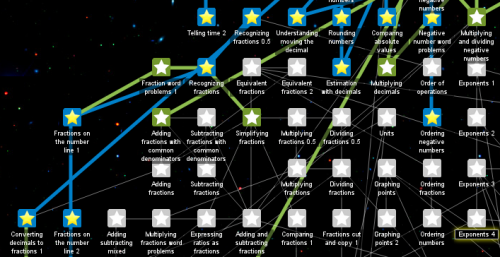
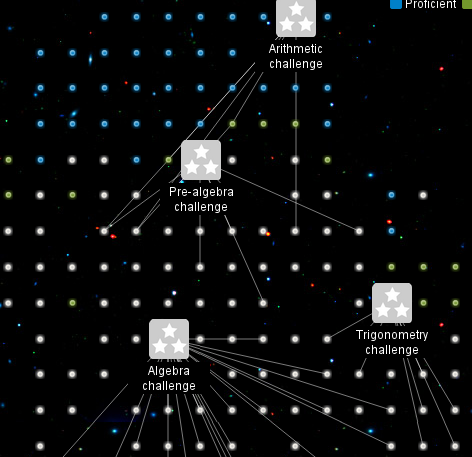
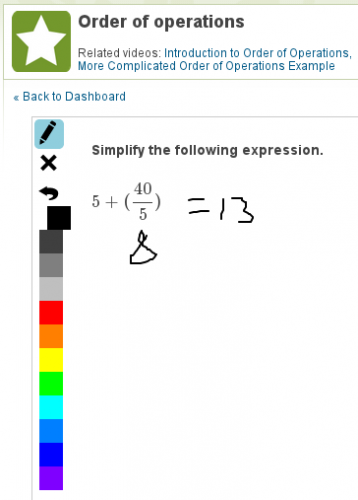
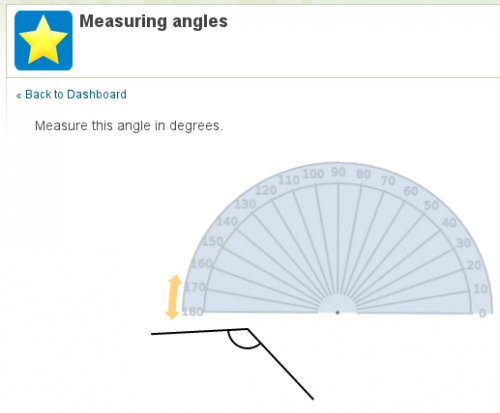
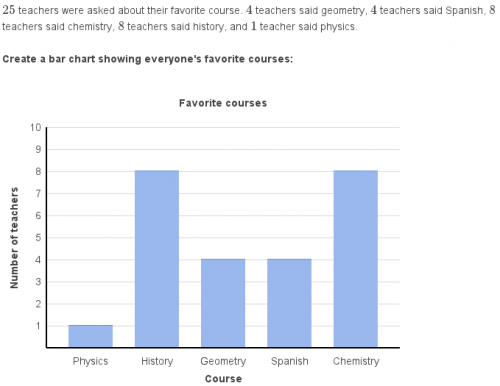
Great review. I believe that khan Academy and Kiva are the two best examples of what it can be achieved with the use of the Internet.
Yup. Both Khan Academy and Kiva are very inspirational and insightful projects.